WHEELS of INDUSTRY
Page 78
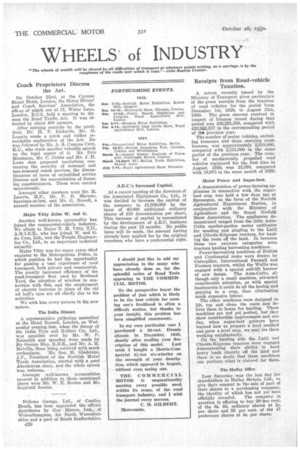
Page 79
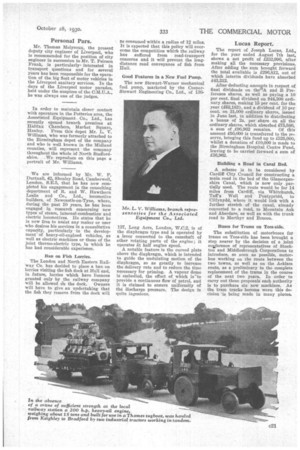
Page 80
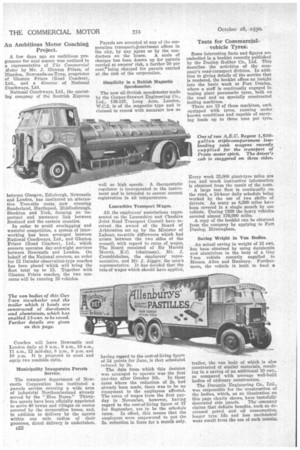
Page 81
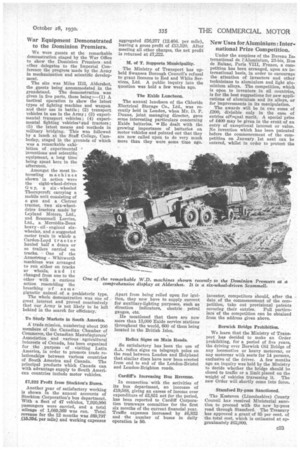
Page 82
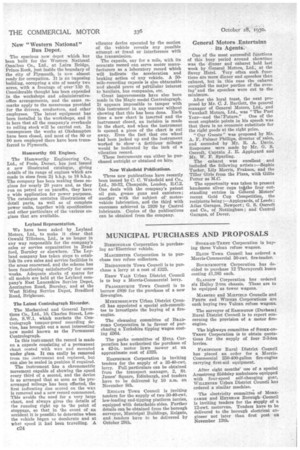
If you've noticed an error in this article please click here to report it so we can fix it.
" The wheels of wealth will be slowed by all difficulties of transport at whatever points arising, as a carriage r's by the roughness of the roads over which it runs."---John Beattie Crozier.
Coach Proprietors Discuss the Act.
On October 22nd, at the Cannon Street Hotel, London, the Motor Hirers' and Coach Services' Association, the offices of which are at 17, Water Lane, London, E.C.3, held a meeting to discuss the Road Traffic Act. It was attended by about 400 persons.
After opening remarks by the president, Mr. H. T. Rickards, Mr. M. Logette made a quick and rather remarkable explanation of the Act: He was followed by Mr. A. S. Comyns Carr, K.O., who made another valuable speech on the legal aspect of it. Mr. Eric Monkman, Mr. C. Dobbs and Mr. J. H. Lowe then proposed resolutions concerning the security of seasonal and non-seasonal coach services, the discontinuance of issue of unjustified service licences and the remuneration of licensing commissioners. These were carried unanimously.
Amongst other speakers were Mr. H. Lawrie, M.P., Mr. P. B. Showan, barrister-at-law, and Mr. G. Nowell, a council member of the association.
Major Vitty Joins W. and G.
Another well-known personality has joined the commercial-vehicle industry. We allude to Major T. H. Vitty, T.D., A.M.1.E.E., who has joined W. and G. du Cros, Ltd., and the Turpin Engineering Co., Ltd., in an important technical capacity.
Major Vitty was for many years chief engineer to the Metropolitan Police, in which position he had the opportunity for gaining a vast experience of road transport, both private and commercial. The greatly increased efficiency of the road-transport fleet used by Scotland Yard, the adoption of wireless in connection with this, and the employment of electric lanterns in place of the old oil bull's eyes are all chiefly due to his activities.
We wish him every success in his new sphere.
The India Dinner.
A representative gathering assembled at the Hotel Russell, London, on Wednesday evening last, when the dinner of the India Tyre and Rubber Ca., Ltd., was presided over by Mr. W. P. Icaisraith and speeches were made by Sir George May, K.B.E., and Mr. A. M. Melville, these being received with much enthusiasm. Mr. Geo. M. Gladstone, J.P., President of the Scottish Motor Trade Association, started with a good Aberdonian story, and the whole speech was welcome. • Amongst -well-known personalities present in addition to those mentioned above were •Mr. W. E. Rootes and Mr. Reginald Rootes.
Fellows Garage, Ltd., of Cradley Heath, has been appointed the official distributor by Guy MOtors, Ltd., of Wolverhampton, for North Worcestershire and a part of South Staffordshire.
c20
A.E.C.'s Increased Capital.
At a recent meeting of the directors of the Associated Equipment Co., Ltd., it was decided to increase the capital of the company to £1,500,000 by the issue of 40,000 additional ordinary shares of £10 denomination per share. This increase of capital is necessitated by the development of A.E.G. business during the past 12 months. No public issue will be made, the amount having already been applied for by the original members, who have a preferential right.
Receipts from Road-vehicle Taxation.
A return recently issued by the Ministry of Transport gives particulars of the gross receipts from the taxation of road vehicles for the period from December 1st, 1929, to August 31st, 1930. The gross amount received in respect of licences issued during that period was £25,221,380, compared with £23,952,317 in the corresponding period of the previous year.
The number of motor vehicles, excluding tramcars and those carrying trade licences, was approximately 2,218,000, compared with 2,131,000 in the same period of the previous year. The number of mechanically propelled road vehicles registered for the first time in August, 1930, was 15,070, compared with 19,073 in the same month of 1929.
Motor Power and Sugar-beet.
A demonstration of power-farming appliances in connection with the sugarbeet crop was held a few days ago at Sprowston, on the farm of the Norfolk Agricultural Experiment Station, in conjunction with the Ministry of Agriculture and the Royal Norfolk Show Association. The appliances demonstrated ranged from the little AutoCulto market-garden motor cultivator for weeding and singling to the Latil and Citran-Kiigresse tractors for hauling the roots off the land. fn between these two extreme categories were tractors hauling harvesting machines.
Power-harvesting machines of British and Continental make were drawn by Caterpillar, International Fannall and Fordson tractors, whilst the Wallis was engaged with a special self-lift harrow of new design. The Auto-Culto, although only a small machine, attracted considerable attention, as with special implements it could do all the hoeing and gapping in a crop, thus eliminating much expensive labour.
The other machines were designed to lift, top and clean the roots and deliver them in heaps for hauling. These machines are not yet perfect, but they show considerable improvement and one day, when sugar-beet growers have learned how to prepare a level seedbed and grow a level crop, we mayT ee them working satisfactorily. '
On the hauling side the Latil and Citroen-Kegresse tractors were engaged demonstrating •their ability to haul heavy loads directly off the land and there is no doubt that these machines can perform what is claimed for them.
The Halley Offer.
Last Saturday_ was the last day for shareholders in Halley Motors, Ltd., to give their consent to the sale of part of their shares to a purchasing company, the identity of which has not yet been
officially revealed. The company in question is offering to buy 50 'per cent. of the 6s. 8d. ordinary shares at 28. per share and 50 per cent. of the preference shares at 4s. per share.. Personal Pars.
Mr. Thomas Molyneux, the present deputy city engineer of Liverpool, who is recommended for the position of city engineer in succession to Mr. T. Peirsou Frank, is particularly' interested in transport questions and for several years has been responsible for the operation of the big fleet of motor vehicles in the Liverpool sanitary services. In the days of the Liverpool motor parades, held under the auspices of the C.M.U.A., he was always one of the judges.
In order to maintain closer contact with operators in the Potteries area, the Associated Equipment Co., Ltd., Las recently opened branch premises at Halifax. Chambers, Market Square, Hanley. From this depot Mr. L. V. Williams, who was formerly attached to the Birmingham depot of the company and who is well known in the Midland counties, will represent the company throughout the whole Of North Staffordshire. We reproduce on this page a portrait of Mr. Williams.
We are informed by Mr. W. P. Durtnall, 42, Shenley Road, Camberwell, London, S,E.5, that he has now completed his engagement in the consulting department of R. and W. Hawthorn Leslie and Co, Ltd., locomotive builders, of Newcastle-on-Tyne, where, during the past 10 years, he has been engaged in research concerning new types of steam, internal-combustion and electric locomotives. He states that he is now free to assist any maker or user who desires his services in a consultative capacity, particularly in the development' of heavy-oil-engined vehicles, as well as electric machines or those of the joint thermo-electric type, in which he has had considerable experience.
Ban on Fish Lorries.
The London and North Eastern Railway Co. has decided to place a ban on lorries visiting the fish dock at Hull and, in future, lorries which have licences granted only by the railway company will be allowed en the dock. Owners will have to give an undertaking that the fish they remove from the dock will De consumed within a radius of 12 miles. It is expected that this policy will overcome the competition which the railway has suffered from road-transport concerns and it will prevent the longdistance road conveyance of fish from Hull.
Good Features in a New Fuel Pump.
The new Stewart-Warner mechanical fuel pump, marketed by the CooperStewart Engineering Co., Ltd., of 136 137, Long Acre, London, W.C2, is of the diaphragm type and is operated by a lever connected to the camshaft of other rotating parts of the engine; it operates at half engine speed.
A notable feature is the curved plate above the diaphragm, which is intended to guide the undulating motion of the diaphragm, so as greatly to increase the delivery rate and to reduce the time necessary for priming. A vapour dome is embodied, the effect of which ieto provide a continuous flow of petrol, and it is claimed to ensure uniformity of the discharge pressure. The design is quite ingenious.
Lucas Report.
The report of Joseph Lucas, Ltd., for the year ended August 7th last, shows a net profit of £232,996, after making all the necessary provisions. After adding the sum brought forward the total available is £296,812, out of which interim dividends have absorbed £43,312.
After deducting amoupts in respect of final dividends on thetA and B Preference shares, as well as paying a 10 per cent. final dividend on 944,300 ordinary shares, making 15 per cent. for the year (B713,183), and a dividend of 10 per cent. on 31,000 ordinary shares, issued in June last, in addition to distributing a bonus of 2s. per share on all the ordinary shares, which absorbed £75,586, a sum of ,i96,962 remains. Of this amount £50,000 is transferred to the reserve bringing this fund up to £525,000, whilst a donation of £10,000 is made to the Birmingham Hospital Centre Fund, leaving to be carried forward a sum of £36,962. .
Building a Road in Canal Bed.
A scheme is to be considered by Cardiff City Council for constructing a main road in the bed of the Glamorganshire Canal, which is now only partially used. The route would be for 14 miles from Cardiff, via Whitchureh, Taff's Well and Pontypridd, to Cillynydd, where it would link with a further stretch of the canal, already converted to a road, to Mountain Ash and Aberdare, as well as with the trunk road to Merthyr and Brecon.
Buses for Trams on Tees-side.
The substitution of motorbuses for trams on Tees-side has been brought a step nearer by the decision of a joint coaference of representatives of Stockton and Middlesbrough Corporations to introduce, so soon as possible, motorbus working on the route between the two towns, as well as on the Acklam route, as a preliminary to the complete replacement of the trams in the course of the next two years. In order to carry out these proposals each authority is to purchase six new machines. As the tram tracks become worn this decision is being made in many places.
An Ambitious Motor Coaching Project.
A few days ago an ambitious programme for next season was outlined to a representative of The Commercial Motor by Mr. J. Glenton Friars, of Blaydon, Newcastle-on-Tyne, proprietor of Menton Friars (Road Coaches), Ltd., and a director of National Coachways, Ltd.
National Coachways, Ltd., the operating company of the Scottish Express
between Glasgow, Edinburgh, Newcastle and London, has instituted an alternative Tees-side route now covering Sunderland, Hartlepool, Middlesbrough, Stockton. and York, forming an important and necessary link between Scotland and the eastern counties.
In order to avoid overlapping and wasteful competition, a system of interworking has been arranged between National'Coachways, Ltd., and Glenton Friars (Road Coaches), Ltd., which coneern operates day-and-night services between Newcastle and London. On behalf of the National concern, an order for 12 Daimler observation-type coaches has been placed which will bring the fleet total up to 15. Together with Glenton Friars coaches, the two concerns will be running 25 vehicles.
Coaches will leave Newcastle and London daily at 8 am., 9 a.m., 10 a.m., 11 a.m., 12 mid-day, 8 pan., 9 p.m. and 10 p.m. It is proposed to erect and equip two roadside cafes.
Municipality Inaugurates Parcels Service.
The transport department of Newcastle Corporation has instituted a parcels service covering a wide area of industrial Northumberland already served by the "Blue Buses." Thirtyfive agents have been officially appointed to serve 40 towns and villages on routes covered by the corporation buses, and, in addition to delivery by the agents within one mile radius of their premises, direct delivery is undertaken.
C22 Parcels are accepted at any of the corporation transport-denartment offices in the city, by any agent or by the con ductors on the buses. A scale of charges has been drawn up for parcels carried at owners' risk, a further 50 per cene'being charged for parcels carried at the risk of the corporation.
Simplicity in a British Magnetic Speedometer.
The new all-British speedometer made by the Cooper-Stewart Engineering Co., Ltd., 136-137, Long Acre, London, W.C.2, is of the magnetic type and is claimed to record with accuracy low as well as high speeds. A thermostatic regulator is incorporated in the instrument and is intended to ensure correct registration in all temperatures.
Lancashire Transport Wages.
All the employers' associations represented on the Lancashire and Cheshire Joint Road Transport Council have received the award of the Board of Arbitration set up by the Minister of Labour, toe settle differences which had arisen between the two sides of the council, with regard to rates of wages. The Board consisted of Sir lilarold .1Vforris, K.C. (chairman), Mr. J. Crombleholme, the erapleyers' reprel sentative, and Mr. J. Jagger, the men's representative. It has decided that the rate of wages which should have applied,
having regard to the cost-of-living figure of 54 _points for June, is that scheduled reduced by 2s.
The date from which this decision was arranged to operate was the first
pay-day, after October 5th. In those cases where the reduction of 2s. had already been made, there was to be no repayment to the employees affected. The rates of wages from the first payday in November, however, having regard to the cost-of-living figure of 57 for September, are to be the schedule rates. In effect, this means that the employers were empowered to put the 2s. reduction in force for a month only. Tests for Commercialvehicle Tyres.
Some interesting facts and figures are embodied in a booklet recently published by the Dunlop Rubber Co., Ltd. This describes the activities of the company's road-transport division. In addition to giving details of the service that is rendered, the booklet offers an insight into the basic work at Fort Dunlop, where a staff is continually engaged in testing giant pneumatic tyres, both on the road and on specially constructed testing machines. There are 12 of these machines, each equipped with tyres, running under known conditions and capable of carrying loads up to three tons per tyre.
Every week 35,000 giant-tyre miles are run and much instructive information is obtained from the result of the tests.
A large test fleet is continually on the road, a 24-hour daily schedule being worked by the use of two shifts of drivers. As many as 8,200 miles have been covered in a single month by one vehicle. During 1929 the heavy vehicles covered almost 176,000 miles.
A copy of the booklet can be obtained from the company by applying to Fort Dunlop, Birmingham.
Saving Weight in Van Bodies.
An actual saving in weight of 15 cwt. has been obtained by using duralurain and aluminium in the body of a Guy 7-ton vehicle recently supplied to Messrs. Allen and Banbury. Furthermore, the vehicle is built to haul a trailer, the van body of which is also constructed of similar materials, resulting in a saving of an additional 10 cwt., as compared with average well-built bodies of ordinary construction.
The Duramin Engineering Co., Ltd., was responsible for the construction of the bodies, which, as an illustration on this page clearly shows, have tastefully decorated side panels. The company claims that definite benefits, such as decreased petrol and oil consumption, longer tyre life and less mechanical wear result from the use of such metals,
War Equipment Demonstrated to the Dominion Premiers.
We were guests at the remarkable demonstration staged by the War Office to show the Dominion Premiers and other delegates to the Imperial Conference the progress made by the Army in mechanization and scientific development.
The site was Miles Hill, Aldershot, the guests being accommodated in the grandstand. The demonstration was given in five parts, these being:—(1) A tactical operation to show the latest types of fighting machine and weapon and their use in battle ; (2) transport vehicles in use in the Army ; (3) experimental transport vehicles ; (4) experimental fighting vehicles t and tractors ; (5) the latest means and methods in military bridging. This was followed by a lunch at the Staff College, Camberley, staged in the grounds of which was a remarkable exhibition of experimental inventions and scientific equipment, a long time being spent here in the afterntron.
Amongst the most interesting machines shown ' in action were the eight-wheel-driven G u y, a six wheeled Thornycroft carrying a mobile unit consisting of a gun and a Cletrac tractor, two six-wheeldrive tractors made by Leyland Motors, Ltd., and Scammell Lorries, Ltd., a. Mercedes-Benz heavy oil engined sixwheeler, and a suggested motor train in which a Carden-Loyd tractor hauled half a dozen or so trailers carried on tracks. One of the Armstrong Whitworth machines was arranged to run either on tracks or wheels, and t changed from one to the other with a curious action resembling the breathing of some gigantic animal of a prehistoric type. The whole demonstration was one of great interest and proved conclusively that our Army is not likely to be left behind in the search for efficiency.
To Study Markets in South America.
A trade mission, numbering about 200 members of the Canadian Chamber of Commerce, the Canadian Manufacturers' Association and various agricultural interests of Canada, has been organized for the , purpose of visiting Latin America, in order to promote trade relationships between various countries of South America and Canada. The principal products which Canada can with advantage supply to South American countries include motor vehicles.
£7,222 Profit from Stoekton's Buses.
Another ;ear of satisfactory working is shown in the annual accounts of Stockton Corporation's bus department. With a fleet of 47 vehicles, 7,920,996 passengers were carried, and a total mileage of 1,089,369 was run. Total revenue for the 12 months was £69,797 ,(15.39d. per mile) and working expenses
aggregated 156,277 (12.40d. per mile), leaving a gross profit of £13,520. After meeting all other charges, the net profit is returned at 17,222.
M. of T. Supports Municipality.
The Ministry of Transport has upheld Swansea Borough Council's refusal to grant licences to Red and White Services, Ltd. A public inquiry into the question was held a few weeks ago.
The Exide Luncheon.
The annual luncheon of the Chloride Electrical Storage Co., Ltd., was recently held in London, when Mr. D. P. Dunne, joint managing director, gave some interesting particulars concerning Exide batteries. 40 He dealt with the growing importance of batteries on motor vehicles and pointed out that they are now called upon to do very much more than they were some time ago.
Apart from being relied upon for ignition, they now have to supply current for auxiliary-lighting purposes, such as direction indicators, electric petrol gauges, etc.
He mentioned that there are now more than 13,000 Exide service stations throughout the world, 600 of them being located in the British Isles.
Reflex Signs on Main Roads.
,So satisfactory has been the use of A.A. reflex signs on telegraph poles on the road between London and Holyhead that similar discs have now been erected from end to end of the London-Bristol and London-Brighton roads.
Cardiff's Increasing Bus Revenue.
In connection with the activities of its bus department, an increase of £19,588, giving an excess of income over expenditure of £3,851 net for the period, has been reported to Cardiff Corporation tramways committee for the first six months of the current financial year. Traffic expenses increased by 16,832 and the number of buses in daily operation is 80.
New Uses for Aluminium: International Prize Competition.
Under the auspices of the Bureau International de l'Aluminium, 23-bis, Rue de Balzac, Paris VIII, France, a competition has been arranged, upon an international basis, in order to encourage the attention of inventors and other technicians to aluminium and light aluminimn alloys. The competition, which is open to inventors in all countries, is for the best suggestions for new applications of aluminium and its alloys, or for improvements in its manipulation.
The awards will be in two sums of 1200, divisible only in the case of entries off equal merit. A special prize of £400 may he given in the event of an entry of exceptional interest or value. No invention which has been patented before the commencement of the competition on January 1st next can be entered, whilst in order to protect tho inventor, competitors should, after the date of the commencement of the competition, take out provisional patents
covering their entries. Full particulare of the competition can be obtained from the address given above.
Berwick Bridge Prohibition.
We learn that the Ministry of Transport has decided to make an Order prohibiting, for a period of five years, the driving over Berwick Old Bridge of any locomotive or heavy motorcar, or any motorcar with seats for 14 persons, exclusive of the driver. A few months ago an inquiry was held by the Ministry to decide whether the bridge should be closed to traffic or a limit placed on the weight of vehicles traversing it. The new Order will shortly come into force.
Stamford By-pass Sanctioned.
The Kesteven (Lincolnshire) County Council has received Ministerial sanction to proceed with the new by-pass road through Stamford. The Treasury has approved a grant of 85 per cent, of the total cost, which is estimated at approximately £62,000. New "Western National" Bus Depot.
The spacious new depot which has been built for the Western National Omnibus Co., Ltd., at Laira Bridge, Prince Rock, just inside the boundary of the city of Plymouth, is DOW almost ready for occupation. It is an imposing building, occupying a site of nearly two acres, with a frontage of over 130 ft. Considerable thought has been expended in the workshops and administrativeoffice arrangements, and the same remarks apply to the messrooms provided for the drivers, conductors, and other employees. The latest equipment has been installed in the workshops, and it is here that all the company's overhauls to rolling stock will be carried out. In consequence the works at Okehampton have been closed, and most of the 80 or 90 men employed there have been transferred to Plymouth.
Hanaworthy Oil Engines.
The Hamworthy Engineering Co., Ltd., of Poole, Dorset, has just issued a new illustrated catalogue, giving details of its range of engines which are made in sizes from 2i b.h.p. to 18 .b.h.p. The company has been making these engines for nearly 20 years and, as they run on petrol or on paraffin, they have a wide application for power purposes. The catalogue contains illustrations of detail parts, as well as of complete power units, together, with specification and other particulars of the various engines that are available.
Leyland Representation.
We have been asked by Leyland Motors, Ltd., to make it clear that Oswald Tillotson, Ltd., is no longer in any way responsible for the company's sales or service organization in Bradford, Burnley or elsewhere. The Leyland company has taken steps to establish its own sales and service facilities in the areas concerned, and the scheme has been functioning satisfactorily for some weeks. Adequate stocks of spares for all models are held at the Leyland company's East Lancashire Service Depot, Accrington Road, Burnley, and at the West Riding Service Depot, Bradford Road, Brighouse.
The Latest Controlograph Recorder.
The Mechanical and General Inventions Co., Ltd., 10, Charles Street, London, S.1V.1, which markets the Controlograph tamper-proof recording device, has brought out a most interesting new model known as the Permanent Contrologranb.
In this instillment the record is made on a capsule consisting of a permanent chart coated with wax mid mounted under glass. It can easily be removed trom tue instrument and replaced, but can also be sealed in position if required.
The instrument has a chronometric movement capable a showing the speed every third of a second, and the device is so arranged that so soon as the prearranged mileage has been effected, the first indicating line scored on the wax is removed and a new record commenced. This avoids the need for a very large chart, and always gives the details of the running right up to the point of stoppage, so that in the event of an accident it is possibla to determine when the vehicle began to decelerate and at what speed it had been travelling. A
vibrator device operated by the motion of the vehicle reveals any possible attempt at fraud or interference with the transmission.
The capsule, say for a mile, with its accurate record can serve motor manufacturers as a laboratory record which will indicate the acceleration and braking action of any vehicle. A 30mile-recording capsule is also obtainable and should prove of paritiCular interest to 'hauliers, bus companies, etc.
Great improvements have alse been made in the Magic model Controlograpb. It appears impossible to tamper with this instrument in any manner without showing that this has been done. Each time a new chart is inserted and the instrument closed, an incision is made in the chart, and when the instrument is opened a piece of the chart is cut away. Even the fact that one wheel had been jacked up and the instrument Worked to show a fictitious mileage would be indicated by the lack of a vibration record.
These instruments can either be purchased outright or obtained on hire.
New Wakefield Publications.
Three new publications have recently been issued by C. C. Wakefield and Co., Ltd., 30-22, Cheapside, London, 3i102. One deals with the company's patent oil gun, grease guns and canisters ; another with the subject of motorvehicle lubrication, and the third with successes achieved in 1930 by Castrol lubricants. Copies of the publications can be obtained from the company.
General Motors Entertains its Agents.
• One of the most successful functions of this busy period around showtime was the dinner and cabaret held last week by _General Motors, Ltd.; at the Savoy Hotel. Very often such functions are more dinner and speeches than cabaret, but in this case the cabaret occupied the major portion of the evening' and the speeches were cut to the minimum.
After the loyal toast, the next proposed by Mr. C. J. Bartlett, the general manager of General Motors, Ltd, and Vauxhall Motors, Ltd., was "The Past Year—and the!Future." One of the most emphatic points in his speech was that there is no economic substitute for the right goods at the right price.
"Our Guests" was proposed by Mr. A. F. Palmer Phillips, director of sales, and seconded by Mr. R. A. Davis. Responses were made by Mr. G. S. Oscroft, Captain J. E. Appleyard and Mr. W. F. Snarling.
The cabaret was excellent and included the following artists :—Sophie Tucker, Lily Morris, Frakson, and the Tiller Girls from the Plaza, with Gillie Potter as M.O.
The opportunity was taken to present handsome silver cups tojsthe four outstanding entries in General Motors' recent Gold Cup Competition, the recipients being:—Appleyards, of Leeds; Atlas Garages, Newport; G. S. Oscroft and Co., of Nottingham; and Central Garages, of Dover.




















































































































































































